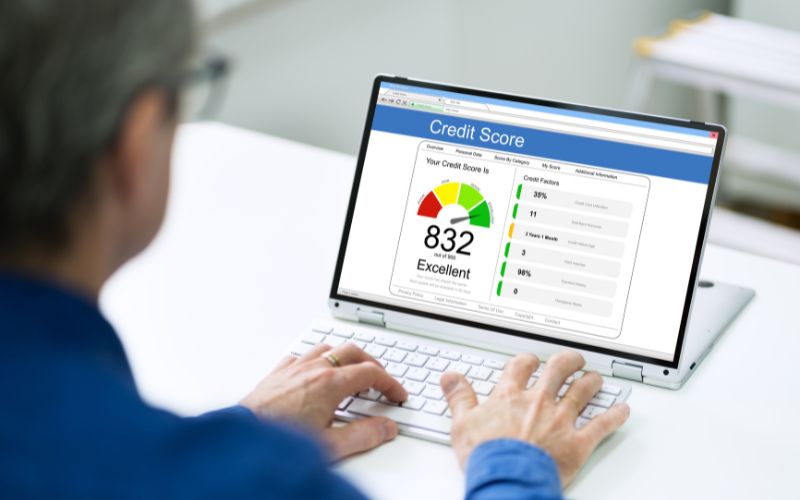In the world of business financing, your business credit score is more than just a number—it’s a critical factor that lenders, banks, and vendors use to gauge your company’s financial reliability. A sudden drop in your score can be alarming, especially if you’re planning to expand, invest in equipment, or apply for a business loan.
So, what causes a credit score dip, and more importantly, how can you bounce back? Let’s explore the common reasons your business credit score dropped and practical steps you can take to recover and strengthen your financial profile.

What Is a Business Credit Score?
Your business credit score is a numerical representation of your company’s creditworthiness. It’s calculated based on your payment history, credit utilization, account age, credit mix, and more. Unlike personal credit scores, business scores typically range from 0 to 100 (with 80+ being excellent) and are maintained by agencies like Dun & Bradstreet, Experian Business, and Equifax Business.
Why It Matters
A strong credit score can help you meet the requirements for loan applications, secure favorable payment terms with suppliers, and even lower your insurance premiums. It plays a crucial role in determining what banks look for when reviewing a loan application, especially when you’re trying to scale your operations or invest in large purchases.
Common Reasons Your Business Credit Score Dropped
Understanding what triggers a credit score drop is the first step in taking corrective action. Below are some of the most frequent causes.
1. You Missed a Payment
Timely payments are one of the most critical factors in both personal and business credit scoring models. When your business misses a payment—whether it’s on a credit card, vendor invoice, loan, or lease—it sends a clear signal to credit bureaus and lenders that your business may be struggling with cash flow or financial discipline.
Even a single missed payment can result in a noticeable drop in your business credit score, especially if the payment is more than 30 days late. The longer the payment remains outstanding, the more significant the impact. Lenders and financial institutions reviewing your profile may interpret this as an early warning sign of insolvency or mismanagement, making it harder to satisfy the requirements for loan applications.
Tip: Automate payments or set reminders to avoid missing due dates.
2. You Have Too Much Debt
Having access to credit is a positive thing—until it’s overused. Credit utilization ratio (the amount of credit used compared to the amount available) plays a major role in determining your creditworthiness. If your business is using too much of its available credit, it may appear over-leveraged or financially stretched.
High debt levels reduce your capacity to take on new credit responsibly, which is exactly what banks look for when reviewing a loan application. For example, if you have a $100,000 credit limit and consistently carry balances of $90,000, your utilization ratio is 90%—a huge red flag to lenders. Ideally, businesses should aim to keep their utilization below 30% of their total credit limit.
Tip: Make regular debt payments and avoid maxing out credit lines.
3. You Haven’t Used Your Credit Card in a While
It might seem like a good idea to avoid using credit altogether, but credit inactivity can backfire. Credit bureaus may not receive any updates about your account if it hasn’t been used for several months, and lenders may decide to close the inactive account.
This reduces your total available credit and can cause your credit utilization ratio to spike, especially if you still carry balances on other active accounts. A higher ratio can hurt your score, even if your payment history is perfect.
Moreover, a closed account also reduces the average age of your credit history, which is another key component of your score. That’s why even small, recurring charges (paid off each month) can help keep your account active and your score healthy.
Tip: Use all credit accounts occasionally to show responsible usage.
4. You Opened a New Credit Account
While expanding your credit can be necessary for business growth, opening new credit accounts should be done strategically. Each application triggers a hard inquiry, which can cause a temporary dip in your credit score—even if you’re approved.
Opening multiple accounts within a short period makes your business appear risky, especially to underwriters who are assessing the requirements for loan applications. They may wonder whether you’re preparing for a cash crunch or struggling to stay afloat.
Additionally, new accounts shorten your average credit history, which can negatively affect your score in the short term.
Tip: Space out credit applications and only apply when truly necessary.

5. You Closed a Credit Account
Closing a credit account—especially one with a high limit or long history—can negatively affect your business credit in two ways:
- Reduced available credit: With less credit at your disposal, your utilization ratio increases.
- Shorter credit history: If the account you close is one of your oldest, your average account age drops.
Both scenarios can lower your business credit score. While it might seem like good practice to close unused accounts, doing so can have unintended consequences—particularly when your business is preparing to meet the requirements for loan applications.
Tip: Keep old accounts open if they don’t incur maintenance fees.
6. You Filed for Bankruptcy
Bankruptcy is one of the most damaging events for a business’s credit profile. It indicates a complete inability to repay debts, and it can stay on your business credit report for up to 10 years, depending on the credit bureau.
After bankruptcy, your score typically drops dramatically, often making it nearly impossible to obtain new financing or lines of credit without collateral, extremely high interest rates, or strict conditions. Lenders see this as a major risk, and it is a critical factor in what banks look for when reviewing your application.
Tip: If bankruptcy is unavoidable, work with professionals to rebuild your credit systematically afterward.
7. Errors in Your Credit Report
Mistakes happen—even with credit bureaus. Errors such as:
- Incorrect payment status
- Duplicate accounts
- Wrong account balances
- Fraudulent accounts
- Accounts that belong to another business
…can all unjustly lower your credit score. If these errors aren’t detected and corrected promptly, they can damage your business’s creditworthiness and hinder your ability to meet the requirements for loan applications.
That’s why it’s vital to review your credit reports regularly and dispute any discrepancies as soon as they appear.
Tip: Use services that allow you to monitor your business credit regularly.
8. Identity Theft
Business identity theft occurs when someone fraudulently uses your business’s name and information to open lines of credit, obtain loans, or make purchases. Unfortunately, you might not realize what’s happening until the damage has already been done—through unpaid balances, collections, or sudden drops in your score.
If fraudulent activity appears on your credit report, it can significantly affect your chances of securing financing. It raises serious red flags during loan evaluations and can make it extremely difficult to meet the requirements for loan applications, especially if unresolved.
Tip: Set up fraud alerts or credit freezes and respond quickly to suspicious activity.5
Less Common Reasons for a Credit Score Drop
While these are less frequent, they can still significantly affect your credit profile.
1. Drop in Available Credit
If your credit limit is reduced by a lender, your utilization ratio increases—negatively affecting your score, even if your spending habits haven’t changed.
2. A Collection Account
Unpaid debts sent to collections will show up on your business credit report and cause immediate damage to your score, signaling major credit risk.
3. Becoming an Authorized User on a Poorly Managed Account
If you’re added as an authorized user to an account with poor credit management, the negative activity can reflect on your credit report as well.
How to Recover from a Credit Score Drop
Fortunately, a credit score drop isn’t the end of the road. With a proactive approach, you can rebuild your credit and position your business for future success.
1. Make Future Payments on Time
The most effective way to improve your credit score is by paying your bills and debts on time. Payment history is one of the most heavily weighted factors in your credit profile.
2. Don’t Apply for More Credit Right Away
Avoid opening new accounts unless absolutely necessary. Each credit inquiry can lower your score slightly, and multiple applications in a short time can make your business look desperate for funds.
3. Keep Your Accounts Open
Unless an account is charging high fees or has become a liability, keep it open. Older accounts help build your credit history and maintain a healthy credit utilization ratio.
4. Check Your Credit Reports for Inaccuracies
Regularly request and review your business credit reports from major bureaus. Dispute any errors or unfamiliar activity to keep your credit score accurate and fair.
5. Pay Off Your Debt
Make a plan to reduce your outstanding balances and avoid maxing out your credit lines. This will improve your utilization ratio and indicate responsible credit behavior.
6. Monitor Your Credit Regularly
Use business credit monitoring tools to stay informed of any changes in your score. Early detection of suspicious activity or errors can prevent long-term damage.
7. Seek Professional Help
If the situation feels overwhelming, consider working with a business credit expert or financial advisor. They can help you create a customized strategy to restore your credit and guide you through the requirements for loan applications when you’re ready.

Vyde: Your Trusted Partner in Financial Recovery and Growth
As you navigate the ups and downs of managing your credit, you don’t have to do it alone. Vyde is your dedicated partner for business accounting, financial planning, and tax strategy. Whether you’re looking to rebuild your credit, streamline your accounting processes, or prepare for tax season, Vyde offers tailored solutions that align with your goals.
With Vyde, you gain:
- Expert financial guidance
- Smart accounting tools
- Real-time credit and cash flow insights
- Support in meeting loan application requirements
- Help with what banks look for when reviewing your financials
Vyde takes the stress out of accounting and credit management so you can focus on growing your business.
Take Control of Your Credit Health
A drop in your business credit score can feel like a major setback, but it’s one you can recover from with the right actions and support. By understanding the causes, taking proactive steps, and aligning with a trusted partner like Vyde, you can rebuild your credit and regain your financial momentum.

